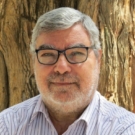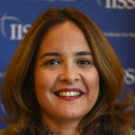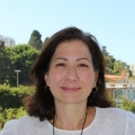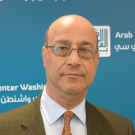Speakers

Rami Khouri
Director of Global Engagement
American University of Beirut

Alia Moubayed
Economist specializing in MENA Region
Moderator
Event Summary
On February 2, 2021, Arab Center Washington DC (ACW) held a webinar titled “The Bitter Harvest of Lebanon’s Sectarian Politics.” Speakers were Rami Khouri, Director of Global Engagement at the American University of Beirut (AUB); Alia Moubayed, an economist specializing in the Middle East/North Africa region; and Mona Harb, Professor of Urban Studies and Politics at AUB and ACW nonresident fellow. ACW’s Director of Research and Analysis, Imad K. Harb, served as moderator.
Rami Khouri examined the interplay of regional and global trends with Lebanese politics and society. He specified four historical periods that, together, explain the genesis of Lebanon’s troubles: the current one that began with the protests of October 2019; the post-2005 period and the exit of the Syrians; the span from the mid-1970s and the civil war until the present; and a larger view of the last one hundred years punctuated early on by modern statehood for Arab countries and later by political, social, and economic stagnation.
Khouri noted that this is the first time in Lebanon’s modern history that the country has lost its distinctive identity as an open and pluralistic society, characteristics that had set it apart from much of the rest of the Arab world. He said that Lebanon has now become “a full-fledged Arab country” with rampant poverty and inequality and a corrupt government that responds militarily to citizens who challenge it and demand their rights. Khouri added that regional military and political intervention in the country has made the situation worse; the interests of Turkey, Iran, Saudi Arabia, Syria, and Israel have become palpable as the recent history of Lebanon has unfolded. Such direct intervention in a country’s affairs has become “a hallmark of the region,” he continued. As for Lebanon’s internal politics, Khouri said that there are now only two major domestic actors: Hezbollah, which is a huge force, and the protesters in the streets. He said that the current stalemate in the political order stems from the Lebanese government’s inability—and unwillingness—to initiate reforms and address the corruption and economic collapse in the country.
Alia Moubayed focused on the interplay of factors—such as sectarianism, widespread clientelism, weakened state institutions, crony capitalism, and more—over the last year or so that contributed to the aggravated financial, economic, and social crisis in Lebanon. Although the protests of October 2019 underlined these problems, Moubayed said that the crises had been ongoing for many years prior and the government did not see the signs nor act. This led to entrenchment of the political elite while the banking sector collapsed. The combination of policy inaction and governmental incompetence came to a head with the port explosion of August 4, 2020. Until now, Moubayed added, Lebanon has exhibited an inability to rebuild and recover from the event and has not capitalized on international goodwill for humanitarian assistance.
Moubayed said that citizens have no trust in the state as they face serious deterioration in the country’s socioeconomic situation. She highlighted the government’s mismanagement of financial issues, such as debt restructuring, which resulted in lowered GDP and per capita income, increased unemployment, hyperinflation especially in food prices, and an erosion of savings. Another result is the out-migration of skilled and professional workers, especially in the medical field as the pandemic rages. She said that such “rapid pauperization” requires a comprehensive approach including political reform, strengthening state institutions, and constructive engagement with the international community to spur new growth. Moubayed concluded with positive remarks about Lebanon’s social solidarity and informal safety net, aspects of Lebanese society on which the country can build in the short to medium term.
Mona Harb centered her remarks on social inequality and vulnerability in Lebanon, the absence of official social policies, and the role of and prospects for opposition politics. She said that for decades, the country’s system of governance has benefited a very small group of people and their networks, causing serious social vulnerabilities. Poverty, income inequality, food insecurity, unemployment, and lack of social protection are some of the symptoms Harb mentioned. She explained the “dynamics of exclusion” of large vulnerable communities as resulting from the historical privileging of small groups based on sectarian and oligarchical bases. Public policies have therefore not addressed the root causes of such suffering but, in fact, have aggravated them. Such a state of affairs has been magnified by Lebanon’s multiple current crises, such as the port blast and the coronavirus pandemic.
Harb discussed studies of the government’s handling of the pandemic that showed how the crisis was used as an opportunity to strengthen sectarian political actors and the army. She explored the Lebanese people’s creation of spaces of solidarity as well as spaces of oppositional politics, saying that over time, protests have been largely fragmented and have varied in their geographies and frequency. She said that the protests in October 2019 were a kind of revolution by many different sectors of society that demanded the resignation of all politicians. Harb stated that opposition groups have been suppressed by the state and army and have sustained many injuries and deaths. Nevertheless, she added that the movement has demonstrated an impressive capacity to organize, work collaboratively, and imagine a just society. Even though the journey for political change is laborious, the building blocks for it are present in Lebanon now; “this organizing matters and hasn’t stopped,” Harb concluded.


